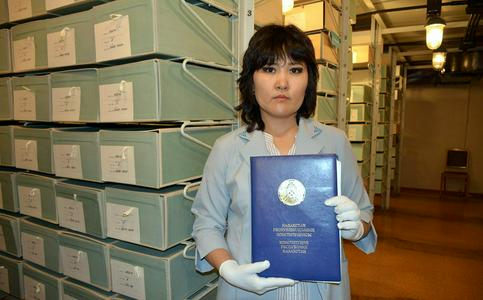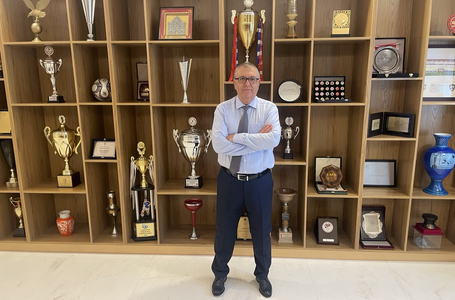The neural network SKAI has joined the board of directors of Kazakhstan’s sovereign wealth fund Samruk-Kazyna. It will have voting rights at board meetings and make decisions on par with other members. The question remains: will artificial intelligence help the fund, whose reform was strongly pushed by the president, or is this simply a publicity stunt?
SKAI (Samruk-Kazyna Artificial Intelligence) was presented to President Kassym-Jomart Tokayev at the Digital Bridge international forum in Astana. It has become the first digital independent board member in the region. The system will analyze internal and external regulatory documents of Samruk-Kazyna, board decisions dating back to 2008, and other materials accumulated since the fund’s inception — all to help its leadership make “more balanced and well-grounded decisions.”
“This is a quantum leap: technology and people are beginning to make decisions together, and digitalization is moving beyond processes to become part of the management philosophy,” noted fund chairman Nurlan Zhakupov during the presentation.
Little is known about the network itself. According to a press release, SKAI operates within a closed environment on Al Farabium, a supercomputer run by Kazakhtelecom — the second most powerful in the country. All information processed remains within Kazakhstan. Its system is built on the Kazakh language model Alem LLM.
SKAI is expected to be put to use at the very next board meeting. A vacancy had opened shortly before its appointment, when Kanat Sharlapaev — former economic aide to Tokayev — was excluded from the board in late September. With its addition, the board now has seven members: Prime Minister Olzhas Bektenov, Samruk-Kazyna chairman Nurlan Zhakupov, independent director Bolat Zhamishev, and three foreign independent directors — Luca Sutera, Wong Heng Fain, and Mohammed Jameel Al Ramahi.
“Corporate Quasi–State Secret”
Samruk-Kazyna was established in 2008 by presidential decree, when Nursultan Nazarbayev still held office. The fund effectively manages all national companies and subsidizes them with state budget resources in times of crisis. Its sole shareholder is the government of Kazakhstan.
Over the years, Samruk-Kazyna has been a constant target of criticism. Public concerns have ranged from the fund’s personnel policies — with individuals lacking the necessary expertise landing in senior positions — to its opaque procurement system.
By January 2022, the situation escalated to the point where President Tokayev ordered a review of the fund’s operations, stating he was prepared to take “tough decisions.” He reportedly told then-chairman Almassadam Satkaliev that he would “fade into oblivion” unless he reformed the fund. Satkaliev did leave his post, though not into obscurity: first moving to the Ministry of Energy, and then, in March of this year, to the chairmanship of the Atomic Energy Agency. Meanwhile, the fund revised its procurement system and reshuffled its leadership.
“The introduction of artificial intelligence to the board of directors of Samruk-Kazyna is an attempt to play all the instruments Tokayev has put on the table,” media analyst Vyacheslav Polovinko told Fergana. “It’s about reforming the fund itself, reforming the quasi–state sector — which happens periodically. Naturally, it’s also about Kazakhstan adopting digitalization as a new national idea. And perhaps there’s even a nod to the Albanian minister who is now also an artificial intelligence system.
But first of all, this AI does not have a decisive vote. It’s important to be clear: it won’t be making the decisions, people will. Formally speaking, it has only one vote. And moreover, its tasks — its prompts — will be set by people. How those prompts are framed will never be known, because that is a kind of corporate quasi–state secret.”
“Digital Obsession”
President Tokayev declared a course toward total digitalization in his address to the nation at the beginning of September, giving himself three years to turn Kazakhstan into a “digital country.” Almost immediately, the republic created a Ministry of Artificial Intelligence and Digital Development, which has already launched a crypto-fund for “long-term investments in digital assets and the creation of reserves.” Just days ago, Telegram co-founder Pavel Durov visited Kazakhstan to announce the opening of an artificial intelligence laboratory in Astana. Tokayev received him personally.
“As for this overall ‘digital obsession’,” continued Vyacheslav Polovinko in his conversation with Fergana, “it basically looks like an interesting experiment: building a digital utopia where machines make all the decisions and human emotions, weaknesses, feelings, and qualities are pushed aside. In theory, even the problem of corruption could be solved this way. But the real question is whether it will work as effectively as Tokayev and the entire Kazakh government hope. Personally, I have serious doubts.
We need to remember that Kazakhstan has had more than a few gigantic, megalomaniacal projects. Even though they’ve now brought in Pavel Durov and everyone else they could, I think it’s all going to function a bit crookedly. Of course, we’ll watch, but while Kazakhstan is busy opening supercomputers and giving artificial intelligence a vote in quasi–state companies, the dollar at local exchange offices has already hit 552 tenge, and prices are rising so fast that people are less concerned about a machine uprising than simply surviving.”
IT specialists consulted by Fergana reacted skeptically to the news of AI joining the board of directors of Samruk-Kazyna, dismissing it as “a publicity stunt.” At the same time, one of the experts noted that with a properly structured dataset used to train the network, its application could yield “positive and very necessary results.”
Observers and Advisors
Kazakhstan is far from the first country to entrust artificial intelligence with a managerial role. The first company to officially appoint AI to its board of directors was Hong Kong’s Deep Knowledge Ventures in May 2014. Its algorithm, called VITAL (Validating Investment Tool for Advancing Life Sciences), was given the right to vote on investment decisions alongside other board members.
In October 2016, the Finnish IT company Tieto (now Tietoevry) appointed the AI system Alicia T. to the leadership of its new data-focused division.
Last year, Abu Dhabi’s International Holding Company (IHC) appointed a non-voting AI observer, Aiden Insight, to its board of directors. In 2025, the company unveiled an upgraded version, Aiden Insight 2.0 — a fully sovereign system hosted within IHC’s infrastructure without reliance on external cloud services. The new version included a live news feed with real-time analytics, the “AskIHC” tool for instant access to financial indicators, and a function for analyzing the company’s entire asset portfolio.
In the United States last year, Realbotix, a company specializing in humanoid robots and AI, appointed a humanoid robot named Arya as an advisor to its board. And just last month, Russia’s Komanda.AI introduced what it called the world’s first fully virtual AI-based board of directors, designed to provide guidance to companies seeking strategic advice.
-
 23 December23.12PhotoTokyo DriveJapan to invest about $20 billion in projects across Central Asia over five years
23 December23.12PhotoTokyo DriveJapan to invest about $20 billion in projects across Central Asia over five years -
 17 December17.12Sake for SixCentral Asia’s Rapprochement with Japan Comes with Hidden Pitfalls
17 December17.12Sake for SixCentral Asia’s Rapprochement with Japan Comes with Hidden Pitfalls -
 17 September17.09Risky PartnershipWhy Dealing with China Is Harder Than It Seems at First Glance
17 September17.09Risky PartnershipWhy Dealing with China Is Harder Than It Seems at First Glance -
 25 November25.11The Constitution doesn’t reignFor whose benefit the fundamental laws of Kazakhstan have been amended and what this has meant for the country
25 November25.11The Constitution doesn’t reignFor whose benefit the fundamental laws of Kazakhstan have been amended and what this has meant for the country -
 24 December24.12To Clean Up and to ZIYAWhat China Can Offer Central Asia in the “Green” Economy
24 December24.12To Clean Up and to ZIYAWhat China Can Offer Central Asia in the “Green” Economy -
 01 November01.11Catching Up with UzbekistanAlisher Aminov on the Problems of Kazakh Football and Plans to Fix Them
01 November01.11Catching Up with UzbekistanAlisher Aminov on the Problems of Kazakh Football and Plans to Fix Them




